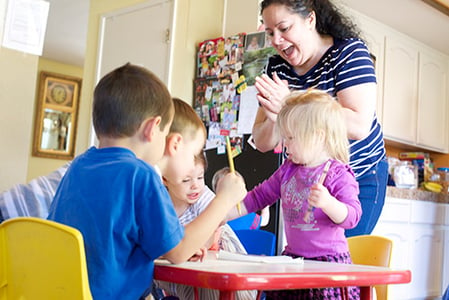
Even though family child care (FCC) settings may differ from other child-care arrangements (and from one another), we truly are a family when it comes to the business of providing care and supporting children and families through early childhood. And the bond that ties our family together? Interactions!
When talking about FCCs, it’s often difficult to describe just what this setting looks like. At Teachstone, we define FCCs as home-based child care that is run as a business; this can include professionals who have several classrooms and employ additional caregivers, or parents who want to earn money while staying at home with their own children. Each provider’s home looks a little bit different, and although FCCs provide care to a good portion of our youngest children (about 29% of infants and 25% of toddlers receiving child-care subsidies are cared for in an FCC home), they vary in terms of number of staff, licensing and oversight, and quality. The variations are most clearly seen in:
- The ratio of providers to children – In FCCs, the ratio is usually lower than center-based care and group sizes are smaller.
- Mixed age ranges – FCC age ranges change throughout the day with different children attending on different days and at different times.
- Wraparound hours – Many FCC providers offer early morning, late evening, and even overnight care; this can mean extremely long days for providers and children.
- Additional responsibilities – FCC providers run a business in addition to caring for children, and often single-handedly. They are responsible for diapering children, as well as buying the diapers, cooking and serving the food, caring for their own children along with the other children.
As you might imagine, many FCC providers struggle because they operate as individuals with little opportunity to meet with peers, share ideas, learn, or receive professional-development support.
Given the number of children and families that look to FCC providers, it’s critical that we focus on supporting the quality of care provided in these home-based settings. At Teachstone, we’ve spent time observing FCC settings with our unique CLASS lens, examining what teacher-child interactions look like and brainstorming with providers about how best to offer support to improve these interactions.
